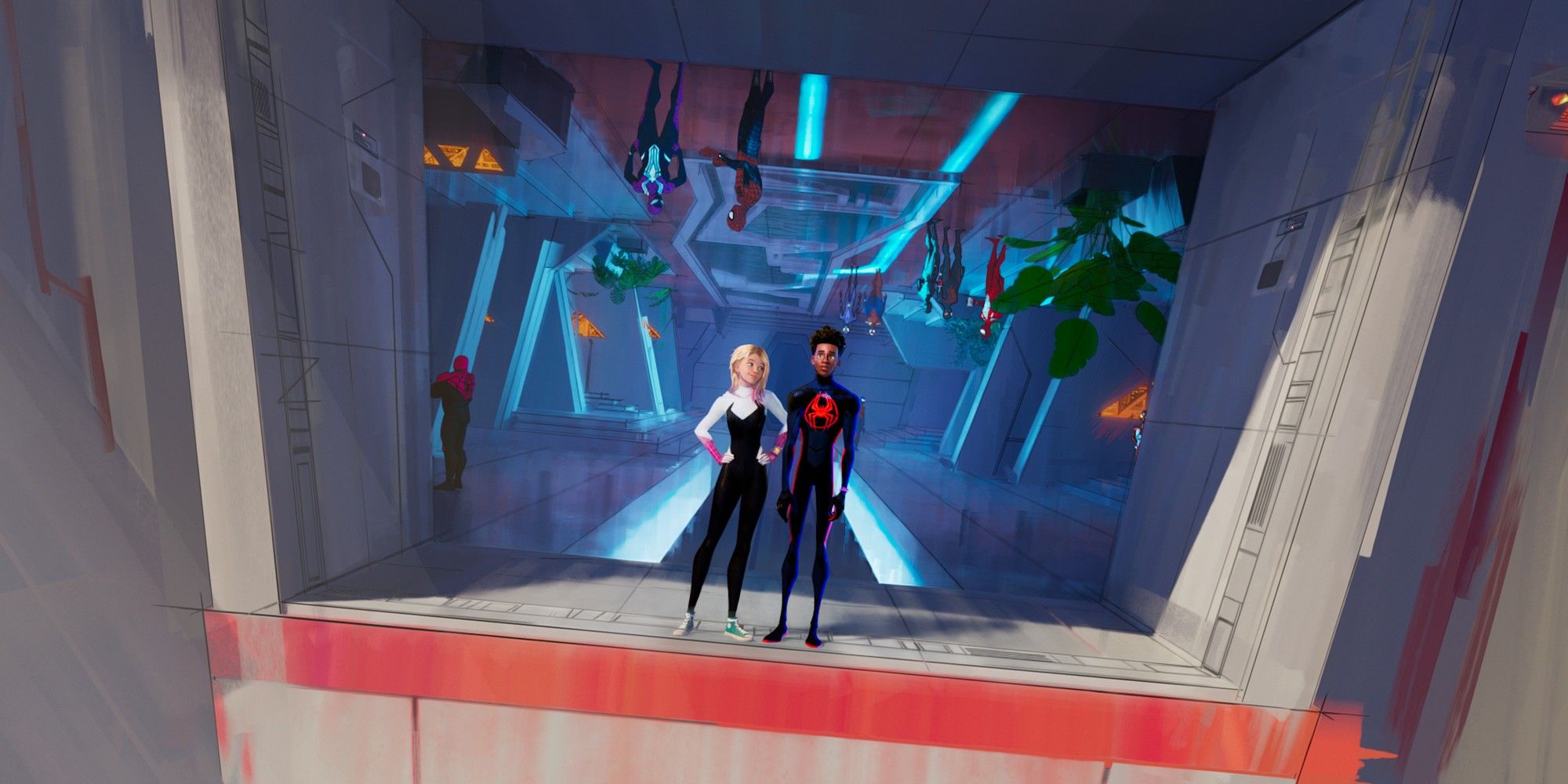When Spider-Man: Into the Spider-Verse released in 2018, it was clear Sony Pictures Animation had something special and with the sequel, Spider-Man: Across the Spider-Verse, Sony solidifies the series as one of the best film franchises of all time. Joaquim Dos Santos (The Legend of Korra), Kemp Powers (Soul) and Justin K. Thompson (The Angry Birds Movie) direct the movie from a script by Phil Lord, Chris Miller (The LEGO Movie), and David Callaham (Shang-Chi and the Legend of the Ten Rings). Spider-Man: Across the Spider-Verse is phenomenal from start to finish, raising the stakes, emotion and heart with beautiful artistic animation.
Spider-Man: Across the Spider-Verse picks up a little over a year after the events of Into the Spider-Verse, finding Miles Morales (Shameik Moore) has grown up and grown into his role as Spider-Man, though he misses his friends - particularly Gwen Stacy (Hailee Steinfeld). When Gwen shows up looking for a villain Miles hadn't quite bested called the Spot (Jason Schwartzman), Miles is determined to help his friend take down the multiversal threat. To do so, Gwen takes him to meet Miguel O'Hara (Oscar Isaac), Jessica Drew (Issa Rae) and the rest of the Spider-Society. However, Miles and Miguel don't see eye to eye on how the Spot should be handled, and Miles finds himself at odds with Spider-Man 2099 and the rest of the Spider-Society as he strives to get back home to his parents, Jefferson (Brian Tyree Henry) and Rio (Luna Lauren Vélez).
While Into the Spider-Verse saw Miles as a kid trying to come to grips with his powers and learn how to be a superhero, Across the Spider-Verse takes the story to its next logical step, featuring Miles as a teenager who wants to belong. Through that desire to belong, though, he finds his beliefs — not only in himself but in his values as a hero — tested by his interactions with Gwen, Miguel and the rest of the Spider-Society. It's Miles' interactions with his parents that really ground the movie and give it a huge heart. It's a much more emotionally complex storyline for Across the Spider-Verse to tackle, but it works well with the movie's themes. Though the emotional throughline is resolved before its end, it should be noted Across the Spider-Verse was originally titled "Part 1" and it does, to a certain extent, feel like only half a movie. A sequel, Spider-Man: Beyond the Spider-Verse, is already set to release in 2024.
Beyond the heart and emotional stakes of Across the Spider-Verse, the directors also pushed the limits when it came to the movie's animation. Into the Spider-Verse was already revelatory in how it used different animation styles for each of the characters and Across the Spider-Verse follows that same principal, bringing a vast number of Spider-Man characters to life with a massive variety of styles. In terms of the main characters, there is a little bit of sameness to their styles, except for Spider-Punk, but there is so much going on visually, there's almost too much for the human eye to take in. Across the Spider-Verse also weaves in music in much the same way as the first film, the song choices adding to the theme of growing up.
The main cast of Across the Spider-Verse works well as a complement to the nearly overwhelming visual aspect of the movie, turning in subtly beautiful performances. Moore manages to play Miles as an older, more confident Spider-Man while still giving him the vulnerability of a teenager trying to figure out who he is. Steinfeld is also a standout as Gwen, getting much more to do in Across the Spider-Verse as we're shown more of her origin story, and her relationship with her father, George Stacy (Shea Whigham), acts as a foil to Miles' dynamic with his parents. Henry and Vélez are also excellent as Jefferson and Rio, working well with Moore to bring their family relationship to life. The rest of the cast is fantastic as well, though none necessarily steal the show from Moore and Steinfeld, which is how it should be.
Ultimately, Spider-Man: Across the Spider-Verse is not just a remarkable animated movie, it's an extraordinary movie full-stop. It's the kind of superhero movie that transcends the genre, appealing to audiences of all ages with its story about growing up, which just happens to be couched in a universe where the Spider-Society exists and pays homage to decades of Spider-Man's multimedia legacy. As such, Across the Spider-Verse is a must-see movie that feels destined to follow in its predecessor's footsteps of winning an Oscar. The film is so stunning and emotionally heart-wrenching that it's worth seeing multiple times, and will no doubt be just as astonishing and entertaining on every viewing.
Spider-Man: Across the Spider-Verse releases in theaters June 2. It is 140 minutes long and rated PG for sequences of animated action violence, some language and thematic elements.




